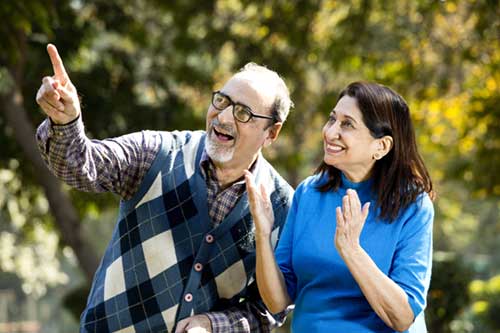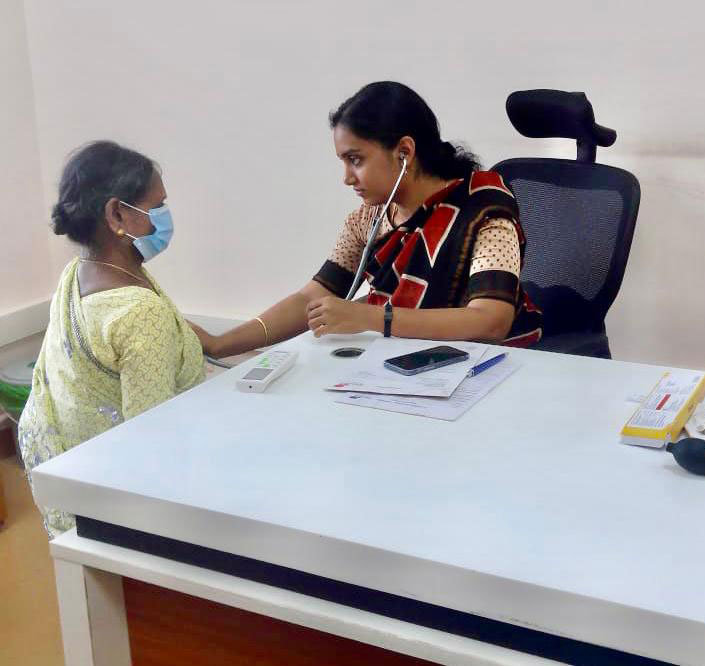The wisdom they have shared is huge and inspiring for Dr. Sushmith to care for the elderly and she takes pride and privilege to be serving our community.
Her hobbies include reading books, exploring new places and pencil sketching.
An article in this month’s K-Way on age-related sensory changes is written by her.

Age-Related Changes in Sensory Perception
In the realm of geriatrics, understanding the age-related changes in sensory perception is a crucial niche awareness topic for older adults. As individuals age, their sensory systems, including vision, hearing, taste, smell, and touch, undergo natural changes that can impact their overall well-being and quality of life. By being aware of these changes, older adults can take proactive steps to adapt, seek appropriate interventions, and maintain their sensory health.

Vision Changes
Age-related vision changes, such as presbyopia (difficulty focusing on close objects), decreased visual acuity, and increased sensitivity to glare, are common among older adults. Awareness of these changes encourages regular eye exams, proper lighting at home, using corrective eyewear, and practicing eye exercises. It also prompts older adults to take precautions when driving, navigating stairs, or engaging in activities that require clear vision.
Hearing Loss
Hearing loss is another prevalent age-related change. Older adults should be aware of the signs of hearing loss, such as difficulty understanding conversations, asking for frequent repetition, or turning up the volume on electronic devices. Seeking professional evaluation, using hearing aids or assistive listening devices, and communicating effectively with others can improve communication and enhance overall well-being.
Taste and Smell Changes
Many older adults experience a decline in taste and smell sensitivity. This can affect appetite, food enjoyment, and overall nutrition. Recognizing these changes can prompt older adults to explore new flavours, experiment with spices, and ensure a well-balanced diet. Regular dental care, proper oral hygiene, and engaging in social eating experiences can also help maintain a healthy sense of taste and smell.
Touch and Tactile Sensations
Age-related changes in the sense of touch may include reduced sensitivity or altered perception of temperature, pain, and pressure. Older adults should be aware of these changes to prevent injuries, burns, or pressure ulcers. Regular skin checks, maintaining proper hygiene, using appropriate clothing layers for temperature regulation, and adapting daily activities to accommodate tactile changes are essential for maintaining skin health and safety.
Multisensory Integration
Awareness of how age-related changes in sensory perception impact multisensory integration is crucial. As sensory systems interact, changes in one sensory modality can affect others. For example, hearing loss may impact speech comprehension and social interactions. Understanding this concept allows older adults to seek comprehensive evaluations and appropriate interventions to optimize sensory integration and maintain overall cognitive function.
Environmental Modifications
It is necessary to make modifications to the environment of the elderly based on these sensory changes. Adequate lighting, contrasting colours for visual clarity, using safety devices (e.g., handrails, grab bars), and reducing noise distractions create an environment conducive to sensory well-being and reduce the risk of accidents.
Seeking Professional Help
Recognizing the importance of seeking professional help is vital. Older adults should be aware of the healthcare professionals who specialize in sensory health, such as optometrists, audiologists, and otolaryngologists. Regular check-ups and consultations can help identify potential issues early on and provide appropriate interventions to optimize sensory health.
Age-related changes in sensory perception significantly impact older adults’ daily lives and well-being. Older adults can proactively adapt, seek suitable interventions, and preserve their sensory health by enhancing their awareness of these changes.
Geriatric medicine offers a comprehensive approach to happy aging for older adults. By emphasizing preventive care, developing individualized care plans, encouraging medication management, facilitating functional assessments, promoting mental health support, and facilitating rehabilitation and physical therapy, geriatric healthcare professionals empower older adults to age gracefully and happily. With a focus on holistic care, geriatric medicine aims to enhance the overall quality of life, ensuring that older adults can embrace their golden years with vitality, independence, and fulfilment.

Dr. K. Sushmitha, M.B.B.S., M.D
Associate Consultant – Geriatrics
Kauvery Hospital Chennai

